UK Government aims to increase production of rapid Covid-19 tests

THE UK Government has commissioned PA Consulting to develop plans to scale up manufacturing of lateral flow device (LFD) Covid-19 tests.
According to The Financial Times, the £6.2m (US$8.5m) contract is mainly for PA Consulting to find suitable British manufacturers of LFD tests, with the aim of scaling up to producing 2m tests a day by April.
The UK has primarily been using imported LFD tests from the US, Korea, and China, the majority of which has come from US company Innova Medical Group. According to The Financial Times, 2m tests were bought by the Government earlier this month from SureScreen, which is the first UK-produced LFD test. The Government is keen to scale up domestic production of the rapid tests.
LFD tests, unlike polymerase chain reaction (PCR) tests, don’t need specialist equipment and can be used outside of a laboratory. They give results within 30 minutes, compared to a day or longer to process a PCR test. PCR tests identify the presence of the SARS-CoV-2 virus when viral RNA is present in a swab. The LFDs contain antibodies which bond with protein antigens from the surface of the virus. If the virus antigens are present, this is indicated by a change of colour on the test strip.
LFD tests have been in use for decades for other purposes such as pregnancy tests, and manufacturing them is a well-established process. According to Al Edwards, Workstream Lead on Diagnostics for IChemE's Covid-19 Response Team, it is a partially continuous process where antibodies and other reagents are incorporated onto batches of specialised papers or pads. This creates a long laminated stack from which individual test strips can be cut.
Scaling up the manufacturing of LFD tests for coronavirus detection, as with PCR tests, will come with its own set of challenges. Edwards said: “One interesting aspect of this process that would be very familiar to chemical engineers, especially those working in the pharmaceutical and biopharma fields, is the combination of high value, fragile and complex materials (antibodies) delivered with great precision, with more mundane materials and processes (plastic cartridges and packaging).
“Like any other advanced and biomedical product, a wide range of specialised materials are required of exact specifications. The supply chain is therefore complex, requiring not just specialised papers and very particular monoclonal antibodies, but the brightly coloured colloidal labels, surfactants and buffers. Multiparameter optimisation is essential to ensure best performance, and robust processes and quality control vital to make sure the end product is safe and effective. Variation in test accuracy is not acceptable.
“The raw materials and manufacturing equipment might not be especially expensive, but the final manufacturing costs include regulatory and safety processes.”
There is still come controversy over using LFD tests to detect the SARS-CoV-2 virus as they are not as accurate as PCR tests. A pilot project in Liverpool using Innova tests found that the Innova LFD only detected three in ten cases with the highest viral loads, according to The BMJ. According to Jon Deeks, Professor of Biostatistics at the University of Birmingham, the LFD tests can be used as a “red light” to find infectious people. However due to the possibility of false negatives, the tests should not be seen as a “green light” to assure someone they are not infectious.
Recent Editions
Catch up on the latest news, views and jobs from The Chemical Engineer. Below are the four latest issues. View a wider selection of the archive from within the Magazine section of this site.




